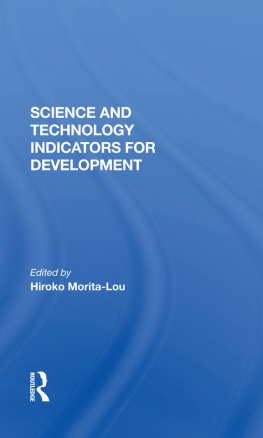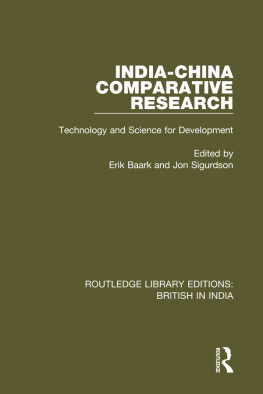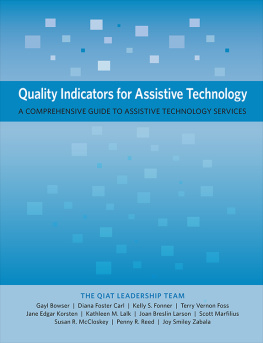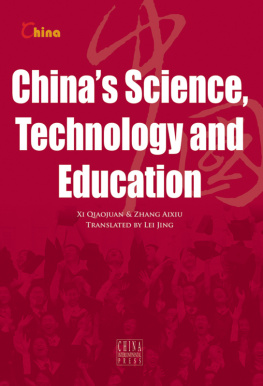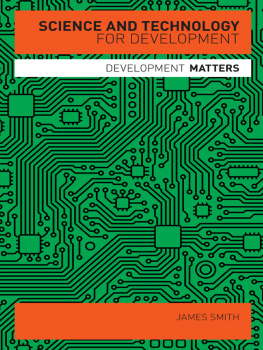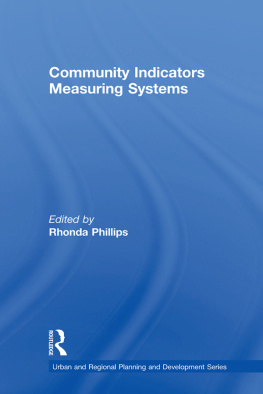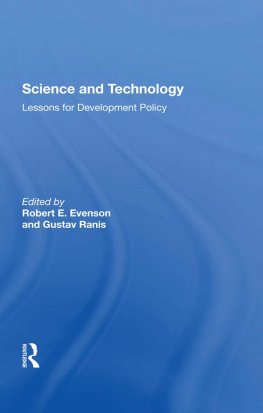SCIENCE AND TECHNOLOGY INDICATORS FOR DEVELOPMENT
Also of Interest from Westview Press
Development as Social Transformation: Reflections on the Global Problematique, edited by Jrgen Heinrichs
Applied Methods of Regional Analysis: The Spatial Dimensions of Development Policy, Dennis A. Rondinelli
Science and Technology for International Development: An Assessment of U.S. Policies and Programs, Robert P. Morgan
Man and Technology: The Social and Cultural Challenge of Modern Technology, edited by Bruce M. Adkins
Export-Oriented Development Strategies: The Success of Five Newly Industrializing Countries, edited by Vittorio Corbo, Anne O. Krueger, and Fernando Ossa
Public Participation in Development Planning and Management: Cases from Africa and Asia, edited by Jean-Claude Garcia-Zamor
Participatory Development, Sheldon Gellar
Cooperation in Science and Technology: An Evaluation of the U.S.-Soviet Agreement, Catherine P. Ailes and Arthur E. Pardee, Jr.
Perilous Progress: Managing the Hazards of Technology, edited by Robert W. Kates, Christoph Hohenemser, and Jeanne X. Kasperson
Availabie in paperback only.
About the Book and Editor
The current indicators used to measure the impact of science and technology in developing countries have been formulated based on conditions and assumptions that are primarily relevant to developed countries. The contributors to this volume contend that these indicators, when applied to developing countries, often lead to inaccurate conclusions. An examination is made of the issues involved in assessing the effects of science and technology, and the problems of constructing and applying accurate science and technology indicators relevant to developing countries are analyzed. The contributors compare their firsthand experiences in the construction of social indicators, discussing the strengths and limitations of currently available indicators and necessary preconditions for their use. The book includes case studies of current programs in Brazil and China.
Hiroko Morita-Lou is associate scientific affairs officer at the United Nations Centre for Science and Technology Development.
Published in Cooperation with the United Nations Centre for Science and Technology for Development
Other Books in the United Nations Science and Technology for Development Series
Research and Development: Linkages to Production in Developing Countries edited by Mary Pat Williams Silveira
Science and Technology Indicators for Development
edited by
Hiroko Morita-Lou
Proceedings of the Panel of Specialists of the United Nations Advisory Committee on Science and Technology for Development Held at Graz, Austria, 2-7 May 1984
First published 1985 by Westview Press, Inc.
Published 2019 by Routledge
52 Vanderbilt Avenue, New York, NY 10017
2 Park Square, Milton Park, Abingdon, Oxon OX14 4RN
Routledge is an imprint of the Taylor & Francis Group, an informa business
Copyright 1985 by the United Nations
All rights reserved. No part of this book may be or reproduced or utilised in any form or by any electronic, mechanical, or other means, now known or hereafter invented, including photocopying and recording, or in any information storage or retrieval system, without permission in writing from the publishers.
Notice: Product or corporate names may be trademarks or registered trademarks, and are used only for identification and explanation without intent to infringe.
Library of Congress Catalog Card Number: 85-51211
ISBN 13: 978-0-367-28668-2 (hbk)
Contents
, Amilcar F. Ferrari
, Leopold Schmetterer and James Mullin
PART ONE
REPORT ON THE MEASUREMENT OF THE IMPACT OF SCIENCE AND TECHNOLOGY ON DEVELOPMENT OBJECTIVES
PART TWO
DISCUSSION PAPERS
, M. Anandakrishnan and Hiroko Morita-Lou
, A. S. Bhalla and A. G. Fluitman
, Pablo Bifani
, Jean-Claude Bochet
, Hajime Eto
, Davidson Frame
, Archibald O. Haller
, Ian Miles
, Michael Moravcsik
, B. Saltykov
, Giorgio Sirilli
, Xu Zhaoxiang
During the last three decades, there have been many kinds of efforts to promote the use of science and technology in developing countries and to analyze their impact. The representative world-wide effort was undertaken in the latter half of the 1970s, resulting in the United Nations Conference on Science and Technology for Development, held at Vienna in 1979. The governments that participated in the conference arrived by consensus at a set of objectives and recommendations that constitute the Vienna Programme of Action on Science and Technology for Development.
The emphasis of the Vienna Programme of Action is on development and on the ways and means of harnessing science and technology to promote the cause of development. Its recommendations are directed toward how best to strengthen the self-reliant endogenous capacities of developing countries for this purpose, what can be done to reshape the international scientific and technological system, and the manner in which the capacities of the United Nations system can be strengthened, including the mobilization and deployment of adequate financial resources.
It is well recognized that one of the major impacts of the world-wide efforts launched in preparation for the Conference was raising the awareness of the developing countries about the various factors underlying their efforts to harness science and technology for development. This increased awareness has resulted in a wide variety of new initiatives in developing countries.
The United Nations Intergovernmental Committee on Science and Technology for Development, which is a body consisting of all states, and which came into existence in 1980 as a result of the conference, has been continuously engaged in defining the steps that could further encourage these initiatives. For this purpose it has categorized the related tasks within the framework of an Operational Plan under eight major programme areas: policies and plans; infrastructures; choice, acquisition and transfer of technologies; human resources; financing; information systems; research and development linkage to the production system; and cooperation among countries.
The Advisory Committee on Science and Technology for Development, which is a body of 28 experts serving in their individual capacities, assists the intergovernmental committee in refining the various concepts of the Vienna Programme of Action and its operational plan, providing specific suggestions to enhance the scope and impact of these initiatives.
During the five years since the Conference, while various initiatives have been underway, there have also been major and somewhat unexpected changes in the world economic and sociological scene, upsetting some of the original ideas of development strategies. Simultaneously, there have been several technological changes which could create major shifts in patterns of production, some of would undoubtedly affect the future prospects of developing countries. These changes require rapid adjustments and revisions in the policies and plans of developing countries, creating an increasing need for a better understanding of the influence of various factors on development perspectives, especially those factors relating to science and technology.


